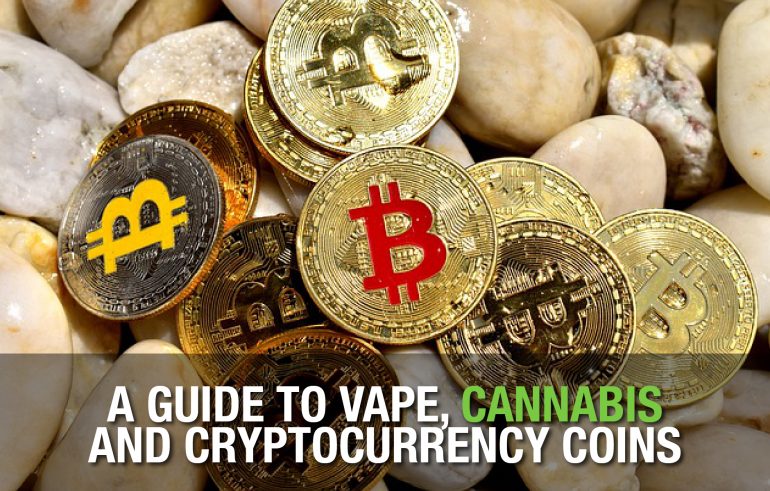Cannabidiol, or CBD for short, has long been lauded for its potential significant medical benefits and pain-reducing aspects. But for all of its popularity and trendiness, CBD is still largely misunderstood by population masses and regulators alike. Although the legislature in the 2018 Farm Bill was recently passed, de-scheduling hemp and CBD, there are still several pain points which circle the CBD industry.
With the CBD industry expected to grow to $2 billion by 2020, it’s no shocker that hundreds of entrepreneurs are viewing CBD’s pain points as a call to arms to provide lucrative solutions to facilitate the growth of the space. Many of these entrepreneurs are jumping head first into blockchain and cryptocurrency, two relatively new technologies that could make a substantial dent and potentially free the CBD space from its woes.
From Bongger (BGR) to Sativacoin (STV) to DopeCoin (DOPE), there is no shortage of appropriately named cannabis-focused cryptocurrencies coming out of the woodwork. The following article explores a few of the most common and most legitimate cryptocurrencies that circle the CBD space, as well as the innovative solutions they offer.
PotCoin (POT)
No cannabis cryptocurrency list would be complete without its poster child, PotCoin.
Launched in January 2014, the Canada-based PotCoin was a pioneer for the intersection of blockchain and marijuana. The token was created to solve the banking problems for businesses and customers seeking to transact in completely legal purchases. In 2017, only 300 of the 11,000 banks in the United States allowed cannabis business owners to create accounts, and that figure was much smaller in 2014.
PotCoin remained relatively dormant but exploded with popularity alongside the overall cryptocurrency industry, hitting a peak on June 12th, 2017 when a video of the controversial perplexing NBA star Dennis Rodman rocked a potcoin.com shirt in North Korea on his way to the historic summit between the Supreme Leader of North Korea Kim Jong Un and the President of the United States Donald Trump.
PotCoin reached an all-time-high market cap of roughly $93,129,000 USD in 2017 and currently sits around $2,900,000 USD. There is a limited supply of PotCoin set at 420 million POT.
ParagonCoin (PRG)
Paragon was established in July 2017 with the intention of creating a suite of products aimed at organizing, systematizing, and creating easily verifiable and transparent cannabis industry solutions.
ParagonCoin (PRG) is the cryptographic token that powers the Paragon ecosystem, which allows businesses and users to easily transfer funds. An interesting solution to note in the Paragon suite is a full seed-to-sale tracking solution that integrates all of the different stages in each individual cannabis-based companies supply chain. Within the scope of CBD products, this would help verify and ensure that the end-product CBD is created from exactly what is expected.
Cultivators are able to enter their relevant crop data and growth cycles, with the final harvest batches becoming linked to smart contracts that track the flow to the point of sales. The immutability of the blockchain would ensure that database information can’t be tampered with at a later date or removed altogether, making it easier for businesses (and regulators) to better understand the flow of products and lax liabilities.
Paragon would later trip into a lawsuit for failure to register its Initial Coin Offering (ICO) with the SEC, which served as a landmark case for all ICOs in the industry. ParagonCoin reached an all-time-high market cap of roughly $57,000,000 USD at the start of 2018 and currently sits around $8,000,000 USD.
Bitcoin and Litecoin
Although not branded as cannabis-based cryptocurrencies, Bitcoin and Litecoin are popular choices for businesses and consumers transact for cannabis and CBD-related products.
Many cannabis and CBD businesses set up portals to accept Bitcoin and Litecoin early on to circumvent opaque regulations that prevented them from accepting credit card payments. As Bitcoin and Litecoin grew their user bases exponentially in 2017 and 2018, many more businesses jumped on board.
Although both cryptocurrencies provide the same end result, they differ in small ways. Bitcoin tends to be more popular due to its massive user base and liquidity, and Litecoin is sometimes preferred because of its lower transaction fees.
Final Thoughts
As the CBD and cannabis space continues to grow, there will likely be an increase in the number of entrepreneurs leveraging the power of blockchain and cryptocurrency to facilitate their business needs. By understanding the current economic and regulatory climate, as well as the technological applications of cryptocurrency, these business owners will be much better equipped to position themselves as leaders in their respective fields.







